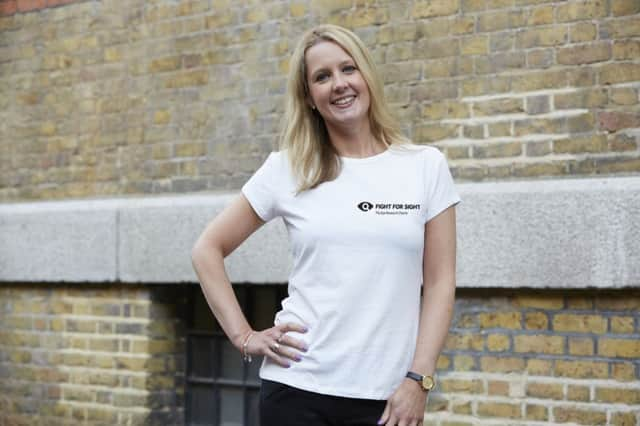Living with degenerating eyesight - Kenilworth mother-of-two shares her story


But for Kenilworth mother-of-two Elizabeth Keell, this is just something she has been forced to accept.
She was diagnosed with keratoconus, a degenerative eye condition, in 1995 when she was just a teenager.
Advertisement
Hide AdAdvertisement
Hide AdShe said: “I went to the optician’s reluctantly with my mum when I was about 15 because I was suffering from really bad headaches and struggling to see what was on the board.
“They could tell there was a huge deterioration in my sight, so they referred me to a hospital. That’s when I got the diagnosis of keratoconus.”
The condition makes the cornea, the front part of the eye that covers the pupil, thinner and more cone-shaped over time. It causes blurred and distorted vision.
She had to visit hospital three times a month for treatment, which affected her A level studies.
Advertisement
Hide AdAdvertisement
Hide AdElizabeth has been offered a cornea transplant for her left eye, but she refused it because of the disruption it could cause.
She added: “My vision is OK at the moment but in my left eye the deterioration is much greater.
“I’ve put the transplant on hold because the cornea might not take. I’d have to take time off work and I wouldn’t be able to drive.
“But equally, if the deterioration continues, I understand that I will need to take up the transplant.”
Advertisement
Hide AdAdvertisement
Hide AdOver the years, Elizabeth has raised thousands for eye charity Fight for Sight, which raises money to fund research for a range of eye conditions such as macular degeneration and glaucoma.
And now the charity would like the public to get involve in its latest fundraising drive called ‘Feast your Eyes’, where participants host a blindfolded food party to challenge their senses.
This is the second year the charity have launched the initiative, and it hopes people will be happy to support it.
Sharon Petrie, interim director of fundraising at Fight for Sight, said: “We’re excited to build on the success of our first Feast your Eyes event by extending this year’s fundraising initiative throughout October.
Advertisement
Hide AdAdvertisement
Hide Ad“We would encourage people to come together with friends, family and colleagues alike to host a fun dine in the dark event and play a part in raising vital funds for pioneering eye research.
“Every day 100 people in the UK start to lose their sight and nearly two million are living with sight loss.
“Fight for Sight fund research into a number of different eye conditions to help make sight loss a thing of the past.”
For Elizabeth, research into keratoconus is vitally important, not just for her sake but for her children’s.
Advertisement
Hide AdAdvertisement
Hide AdScientists are still unsure as to whether the condition is contracted from genetic, environmental or cellular factors. The consensus is it is a combination, but more research is needed.
Elizabeth said: “I think eye research is so important to me because if it is a genetic disease it could be likely that one of my daughters could develop keratoconus.
“I think the research is crucial to find new, less invasive treatments that can help save people’s sight.”
***
Fundraisers should visit fightforsight.org.uk/feast to register. They will receive a free Fight for Sight pack complete with blindfolds.
Advertisement
Hide AdAdvertisement
Hide AdThen they should decide on a date in October to host their party and invite guests along to the dinner.
Once the guests arrive, everyone should put their blindfolds on for a ‘dining in the dark’ experience.
Instead of blindfolds, hosts could instead turn the lights off or black out the windows - anything to make seeing the food harder will do.
Anyone can register to host a dinner party, including those with first-hand experience of sight loss, those who have a loved-one affected by an eye condition, eye health professionals, researchers or those who simply want to do something fun to support a valuable cause, to register to host an event.
Advertisement
Hide AdAdvertisement
Hide AdEveryone who raises money through the dinner parties will fund research into a variety of eye conditions such as macular degeneration, glaucoma, diabetic retinopathy, cataracts, corneal disease, and rare eye conditions.